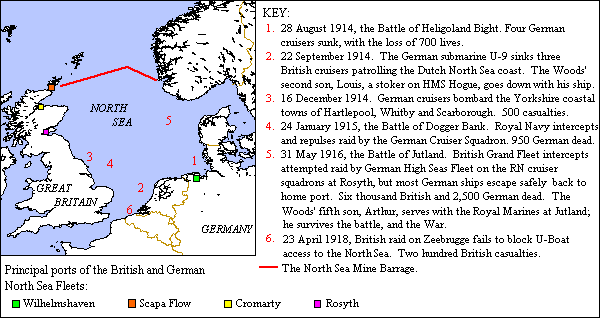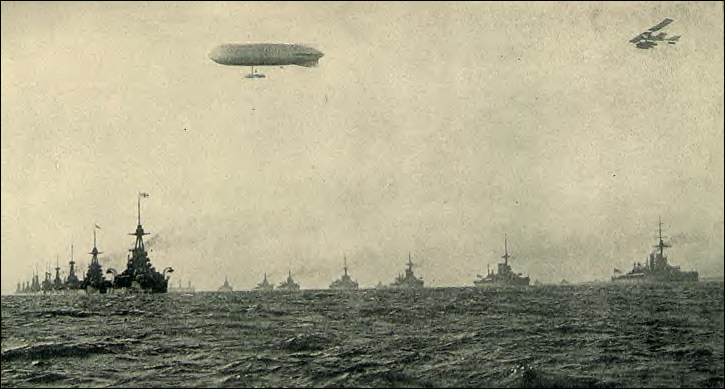31 May - 1 June 1916
With two large, modern battle fleets vying for domination of the North Sea, the public in both Britain and Germany expects that naval supremacy will be decided by a major naval action, which will be as decisive as Nelson's victory at Trafalgar had been in the Napoleonic Wars. When war breaks out, expectation is particularly high among the German public, which is confident that the Imperial German Navy, with its modern ships and well-trained crews, will inflict enough damage on the Royal Navy to finally destroy British supremacy at sea.
In reality, it soon becomes clear that modern innovations in weaponry and communications have transformed naval warfare since Nelson's day. From its base at Scapa Flow in the Orkneys, the Royal Navy's Grand Fleet maintains at a distance its supremacy over the North Sea. Thanks to the North Sea Mine Barrage (a field of 70,000 mines stretching from Scotland to Norway), and a network of radio listening stations which ensure that the German Battle Fleet can scarcely move without the Admiralty being aware of it, the High Seas Fleet is effectively blockaded in port: denied freedom of movement within, or even access to, the North Sea.
For the first two years of the war, the Grand Fleet and the High Seas Fleet remain for the most part in their respective home ports of Scapa Flow and Wilhelmshaven, and the limited actions which do occur in the North Sea are carried out by smaller formations.

Unknown to Scheer, however, the Royal Navy is intercepting and decoding German naval communications - thanks to the Russian Navy's capture of a German codebook in the Baltic in 1914 - and is aware of the departure of the German battlecruisers and main fleet. During the evening of 30 May, the Royal Navy's Grand Fleet at Scapa Flow, its Fifth Battle Squadron at Cromarty, and its Battlecruiser Squadron at Rosyth, all put to sea. By two o'clock the following afternoon, a British Naval force of twenty-eight battleships, nine battle cruisers, thirty-four light cruisers and eighty destroyers is bearing down on the German High Seas Fleet.

At about about 4:30pm, Beatty sights Scheer's High Seas Fleet closing on the engagement, and turns north, to draw the German Fleet into the path of Admiral Jellicoe's rapidly closing Grand Fleet. A fierce engagement between the two battle fleets begins around 6:00pm, in which a third British cruiser, HMS Invincible is lost with almost all hands. Although the Grand Fleet manages to insert itself between the German ships and their route home, low visibility and poor British communications allow the bulk of Scheer's ships to avoid prolonged action and to run for home under cover of darkness. Hipper's battlecruisers, which cover Scheer's withdrawal during the night of 31 May - 1 June, take heavy punishment.
The Royal Navy loses fourteen ships sunk and seven severely damaged, as well as 6,000 sailors killed in the confrontation at Jutland. Germany suffers fewer losses - eleven ships lost, nine severely damaged, and 2,500 casualties. On this basis, the Kaiser proclaims Jutland a major naval victory for Germany, although Admiral Scheer's assessment is different: Jutland confirms to him that the Grand Fleet so dominates the North Sea that the High Seas Fleet cannot undertake any operations there without risking complete annihilation. In his report on the battle, he warns the Kaiser that the German surface fleet cannot on its own bring about victory at sea, and that Germany must resort instead to unrestricted submarine warfare. After 1 June 1916, the High Seas Fleet does not put to sea again to risk confrontation with the Grand Fleet.
In Britain too, there is disappointment in the outcome of the long-awaited engagement with the Imperial Navy. Although the Grand Fleet has succeeded in intercepting the Germans' intended operation, and forced the High Seas Fleet back to port, it has not capitalised on its numerical advantage to break the power of the German fleet, most of which has managed to flee to safety. Denied the decisive military victory it had hoped for, the Grand Fleet's primary contribution to winning the war now lies in maintaining its blockade of German ports, starving Germany of essential food supplies and war materiel, and undermining that nation's will to fight on.